Original
I'm trying to aggregate a CSV file and experiencing [what I consider to be] excessive memory usage and/or GC effort. The issue seems to arise when the number of groups increases. There is no problem when the keys are in the hundreds or thousands, but quickly starts spending a majority of time in the GC when the keys reach tens of thousands.
Update
Moving from Data.ByteString.Lazy.ByteString to Data.ByteString.Short.ShortByteString significantly reduced the memory consumption (to a level I think is reasonable). However, the amount of time spent in the GC still seems far higher than I would expect to be necessary. I moved from Data.HashMap.Strict.HashMap to Data.HashTable.ST.Basic.HashTable to see if the mutation in ST would help but it did not appear to. The following is the current full test code, including generateFile to create a test sample:
{-# LANGUAGE OverloadedStrings #-}
module Main where
import System.IO (withFile, IOMode(WriteMode))
import qualified System.Random as Random
import qualified Data.ByteString.Short as BSS
import qualified Data.ByteString.Lazy.Char8 as BL
import qualified Data.Vector as V
import qualified Data.Vector.Mutable as MV
import qualified Control.Monad.ST as ST
import qualified Data.HashTable.ST.Basic as HT
import qualified Data.HashTable.Class as HT (toList)
import Data.Hashable (Hashable, hashWithSalt)
import Data.List (unfoldr)
import qualified Data.Traversable as T
import Control.Monad (forM_)
instance Hashable a => Hashable (V.Vector a) where
hashWithSalt s = hashWithSalt s . V.toList
data CSVFormat = CSVFormat {
csvSeparator :: Char,
csvWrapper :: Char
}
readCSV :: CSVFormat -> Int -> FilePath -> IO [V.Vector BSS.ShortByteString]
readCSV format skip filepath = BL.readFile filepath >>= return . parseCSV format skip
parseCSV :: CSVFormat -> Int -> BL.ByteString -> [V.Vector BSS.ShortByteString]
parseCSV (CSVFormat sep wrp) skp = drop skp . unfoldr (\bs -> if BL.null bs then Nothing else Just (apfst V.fromList (parseLine bs)))
where
{-# INLINE apfst #-}
apfst f (x,y) = (f x,y)
{-# INLINE isCr #-}
isCr c = c == '\r'
{-# INLINE isLf #-}
isLf c = c == '\n'
{-# INLINE isSep #-}
isSep c = c == sep || isLf c || isCr c
{-# INLINE isWrp #-}
isWrp c = c == wrp
{-# INLINE parseLine #-}
parseLine :: BL.ByteString -> ([BSS.ShortByteString], BL.ByteString)
parseLine bs =
let (field,bs') = parseField bs in
case BL.uncons bs' of
Just (c,bs1)
| isLf c -> (field : [],bs1)
| isCr c ->
case BL.uncons bs1 of
Just (c,bs2) | isLf c -> (field : [],bs2)
_ -> (field : [],bs1)
| otherwise -> apfst (field :) (parseLine bs1)
Nothing -> (field : [],BL.empty)
{-# INLINE parseField #-}
parseField :: BL.ByteString -> (BSS.ShortByteString, BL.ByteString)
parseField bs =
case BL.uncons bs of
Just (c,bs')
| isWrp c -> apfst (BSS.toShort . BL.toStrict . BL.concat) (parseEscaped bs')
| otherwise -> apfst (BSS.toShort . BL.toStrict) (BL.break isSep bs)
Nothing -> (BSS.empty,BL.empty)
{-# INLINE parseEscaped #-}
parseEscaped :: BL.ByteString -> ([BL.ByteString], BL.ByteString)
parseEscaped bs =
let (chunk,bs') = BL.break isWrp bs in
case BL.uncons bs' of
Just (_,bs1) ->
case BL.uncons bs1 of
Just (c,bs2)
| isWrp c -> apfst (\xs -> chunk : BL.singleton wrp : xs) (parseEscaped bs2)
| otherwise -> (chunk : [],bs1)
Nothing -> (chunk : [],BL.empty)
Nothing -> error "EOF within quoted string"
aggregate :: [Int]
-> Int
-> [V.Vector BSS.ShortByteString]
-> [V.Vector BSS.ShortByteString]
aggregate groups size records =
let indices = [0..size - 1] in
ST.runST $ do
state <- HT.new
forM_ records (\record -> do
let key = V.fromList (map (\g -> record V.! g) groups)
existing <- HT.lookup state key
case existing of
Just x ->
forM_ indices (\i -> do
current <- MV.read x i
MV.write x i $! const current (record V.! i)
)
Nothing -> do
x <- MV.new size
forM_ indices (\i -> MV.write x i $! record V.! i)
HT.insert state key x
)
HT.toList state >>= T.traverse V.unsafeFreeze . map snd
filedata :: IO ([Int],Int,[V.Vector BSS.ShortByteString])
filedata = do
records <- readCSV (CSVFormat ',' '"') 1 "file.csv"
return ([0,1,2],18,records)
main :: IO ()
main = do
(key,len,records) <- filedata
print (length (aggregate key len records))
generateFile :: IO ()
generateFile = do
withFile "file.csv" WriteMode $ \handle -> do
forM_ [0..650000] $ \_ -> do
x <- BL.pack . show . truncate . (* 15 ) <$> (Random.randomIO :: IO Double)
y <- BL.pack . show . truncate . (* 50 ) <$> (Random.randomIO :: IO Double)
z <- BL.pack . show . truncate . (* 200) <$> (Random.randomIO :: IO Double)
BL.hPut handle (BL.intercalate "," (x:y:z:replicate 15 (BL.replicate 20 ' ')))
BL.hPut handle "\n"
I receive the following profiling result:
17,525,392,208 bytes allocated in the heap
27,394,021,360 bytes copied during GC
285,382,192 bytes maximum residency (129 sample(s))
3,714,296 bytes maximum slop
831 MB total memory in use (0 MB lost due to fragmentation)
Tot time (elapsed) Avg pause Max pause
Gen 0 577 colls, 0 par 1.576s 1.500s 0.0026s 0.0179s
Gen 1 129 colls, 0 par 25.335s 25.663s 0.1989s 0.2889s
TASKS: 3 (1 bound, 2 peak workers (2 total), using -N1)
SPARKS: 0 (0 converted, 0 overflowed, 0 dud, 0 GC'd, 0 fizzled)
INIT time 0.000s ( 0.002s elapsed)
MUT time 11.965s ( 23.939s elapsed)
GC time 15.148s ( 15.400s elapsed)
RP time 0.000s ( 0.000s elapsed)
PROF time 11.762s ( 11.763s elapsed)
EXIT time 0.000s ( 0.088s elapsed)
Total time 38.922s ( 39.429s elapsed)
Alloc rate 1,464,687,582 bytes per MUT second
Productivity 30.9% of total user, 30.5% of total elapsed
gc_alloc_block_sync: 0
whitehole_spin: 0
gen[0].sync: 0
gen[1].sync: 0
